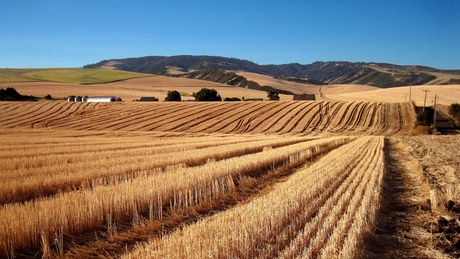forum
library
tutorial
contact

Wheat Farmers Anticipate
Impacts of TPP Without U.S.
by Matthew WeaverCapital Press, March 9, 2018
|
the film forum library tutorial contact |

|
Wheat Farmers Anticipate
by Matthew Weaver |
The Trans-Pacific Partnership is slated to be signed March 8 in Chile, without the United States.
U.S. wheat farmers fear the impact could be similar to a frog slowly boiling in hot water.
 Mike Carstensen and his son were going to purchase some equipment for their farm this year. Now they're waiting to see how overseas wheat markets fare after the Trans-Pacific Partnership is signed without U.S. involvement.
Mike Carstensen and his son were going to purchase some equipment for their farm this year. Now they're waiting to see how overseas wheat markets fare after the Trans-Pacific Partnership is signed without U.S. involvement.
"All of a sudden, now we're going to put everything on hold," said Carstensen, a Lincoln County, Wash., wheat farmer and board member of the Washington Grain Commission. "We're going to try to hunker in and see what happens."
Farmers and the rest of the industry are worried about the ramifications of the Trans-Pacific Partnership proceeding without the U.S. The remaining 11 countries -- including key Pacific Rim customers such as Japan -- were slated to sign the agreement March 8 in Chile.
U.S. Wheat Associates, the National Association of Wheat Growers and 33 organizations representing 19 states have sent a letter to U.S. Trade Representative Robert Lighthizer, urging the Trump administration to prioritize rejoining the agreement. Trump withdrew from the deal in January 2017.
TPP will reduce the tariffs Japanese flour millers pay for imported Australian and Canadian wheat over nine years, from about $150 per ton to $85 per ton. Australia and Canada are signatories of TPP. At the same time, tariffs on imported U.S. wheat would remain at about $150 per ton, according to the letter. The organizations say Japanese millers would reformulate their product mix to avoid the need to purchase artificially expensive U.S. wheat.
Japan imports about 3 million metric tons of U.S. wheat each year, with an average value of more than $800 million. The organizations estimate the price disadvantage would force Japan to reduce wheat purchases to about 1.35 million metric tons, a loss of nearly $500 million each year.
Farmers haven't yet seen an impact on the market, but they expect it, said Gary Bailey, a St. John, Wash., wheat farmer and chairman of the grain commission.
"It's farther-reaching than just the producer," Bailey said. "The equipment dealers, input suppliers, on down the line -- it could have quite an effect on them."
"Anybody that raises wheat is going to be impacted in the entire country," said Darren Padget, a Grass Valley, Ore., farmer and incoming U.S. Wheat secretary-treasurer. "Everybody's going to get hit by this."
Padget said he's "saddened" that farmers spent 60 to 70 years working to establish the Asian market.
"I hate to see that all thrown down the drain," he said.
Customers in Japan know that wheat farmers were against dropping out of the TPP, Padget said.
"But we have two governments in between that obviously have to negotiate this out," he said. "I was really, really hoping there was something going on behind the scenes that I wasn't (privy) to. I still hope there's something going on, but every day, I lose a little bit of faith, I hate to say it."
"A lot of Montana supported President Trump, and so we're hoping he will do the right thing here and re-engage with TPP once again," said Alan Klempel, a wheat farmer in Bloomfield, Mont.
Klempel estimates wheat prices could drop 50 to 60 cents without the U.S. involved in TPP. The drop would come on top of low yields and a severe drought last year in Montana, he said.
"For producers in our area, that could be devastating," he said.
Farmers are already trying to get the lowest cost of production possible, Carstensen, the Washington farmer, said.
Older farmers with equity can weather a storm, he said. He's worried about younger farmers, like his son, who hopes to take over the operation.
"In the short term, sure, we're going to feel it," he said. "But in the longer term, I think it'll hurt us even worse."
Padget, the Oregon farmer, likens the situation to being a frog sitting in a pot of water slowly reaching a boil.
"It doesn't happen all at once, but pretty soon, ‘Oh my goodness -- there's a problem here,' you start feeling it," he said.
learn more on topics covered in the film
see the video
read the script
learn the songs
discussion forum
